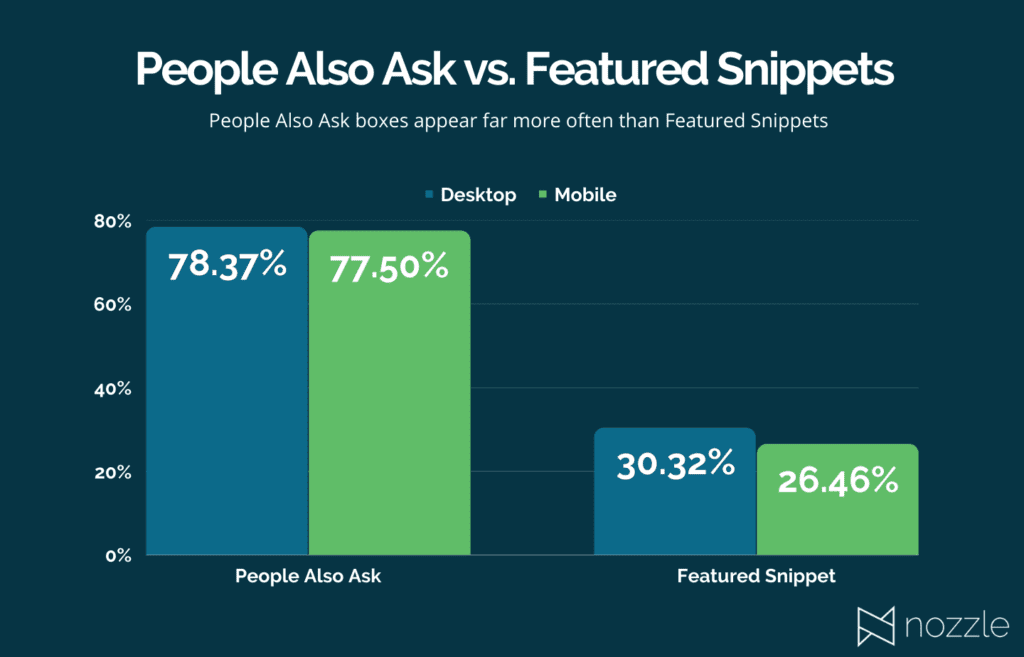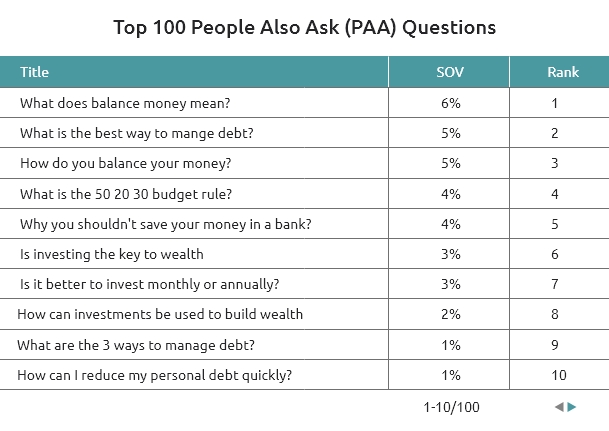Uncover the mystery behind Google’s People Also Ask feature and how it can enhance your search experience online.

Image courtesy of via DALL-E 3
Table of Contents
Welcome, curious readers! Have you ever wondered why when you search for something on the internet, you see more questions related to what you were looking for? Well, that’s all thanks to a cool feature called “People Also Ask.” In this article, we’ll dive into what “People Also Ask” is all about and why it’s such an essential part of your online search experience.
What is ‘People Also Ask’?
Imagine you’re searching for information on your favorite animal, and as you scroll through the search results, you come across a box filled with extra questions like “What do animals eat?” or “Where do they live?” That box is what we call “People Also Ask” (PAA). It’s like a treasure trove of additional questions related to what you searched for, right at your fingertips!
Why is ‘People Also Ask’ Important?
Now, you might be wondering, why do we even need ‘People Also Ask’? Well, think about it this way – when you have more questions and answers right there on the search page, you can find the information you need quickly and easily. PAA helps you explore different angles of a topic and learn more without having to dig through tons of search results. It’s like having a helpful friend who knows all the right questions to ask!
How ‘People Also Ask’ Works
Behind the Scenes of PAA
When you search for something on the internet, search engines like Google use special programs called algorithms to help them guess what other questions you might have. These algorithms look at the words you type in and use math to figure out what other questions people commonly ask about that topic. This is how the ‘People Also Ask’ (PAA) feature works.
Finding the Best Answers
Once the search engine generates these related questions, it looks for the best answers to show in the PAA box. It scans through websites and articles to find the most accurate and helpful information. Search engines want to make sure that they provide you with valuable answers to your questions quickly.
Why People Use ‘People Also Ask’
When you’re searching for information online, you might come across a section called ‘People Also Ask’ (PAA). Have you ever wondered why people use this feature? Let’s find out!
Saving Time
One of the main reasons people use the ‘People Also Ask’ feature is to save time. Instead of typing in more search queries or browsing through multiple websites, PAA provides additional questions related to what you’re already looking for. This means you can quickly find answers without wasting precious time.
Learning More
Another benefit of using ‘People Also Ask’ is that it helps users learn more about a topic. By suggesting related questions, PAA allows you to explore different aspects of a subject that you might not have considered. This can broaden your knowledge and give you a better understanding of the topic you’re interested in.
How ‘People Also Ask’ Benefits Websites
When websites appear in the ‘People Also Ask’ (PAA) section of search engine results, it can greatly benefit them in terms of visibility and traffic. Let’s explore how being featured in PAA can be advantageous for websites.

Image courtesy of letterdrop.com via Google Images
Increased Visibility
The PAA feature on search engines displays related questions and answers alongside the main search results. Websites that are featured in the PAA box gain increased visibility as users are more likely to click on these highlighted results. This can lead to more exposure for the website and potentially attract new visitors.
Driving More Traffic
By being included in the PAA section, websites have the opportunity to drive more traffic to their pages. When users click on the questions within the PAA box and are directed to a website for more information, it can result in increased traffic and clicks. This can help websites reach a larger audience and increase their overall website traffic.
Tips for Using ‘People Also Ask’
When using the ‘People Also Ask’ feature on search engines, it’s crucial to ask the right questions. This means being specific and clear about what information you are looking for. By formulating your questions thoughtfully, you can obtain the best answers from the related questions provided in the PAA box.
Explore Extra Questions
Don’t be afraid to click on the extra questions that appear in the ‘People Also Ask’ section. These additional queries can lead you to more in-depth information and fascinating details on the topic you are researching. Exploring these extra questions can help you expand your knowledge and discover new insights.
Writing for ‘People Also Ask’
When creating content for the ‘People Also Ask’ (PAA) feature on search engines, it is essential to focus on answering common questions that users might be searching for. By addressing these frequently asked queries in your content, you increase the chances of your website appearing in the PAA box, providing valuable information to users.

Image courtesy of growbydata.com via Google Images
Use Simple Language
One crucial tip for writing content that may appear in the PAA section is to use simple and clear language. Search engines look for content that is easy to understand, so using straightforward words and explanations can help improve the visibility of your website in search results.
Challenges with ‘People Also Ask’
One of the challenges with the ‘People Also Ask’ feature is the risk of misinformation. Sometimes, the answers provided in the PAA section may not be entirely accurate or reliable. This can be problematic, especially when users are looking for trustworthy information. It’s essential to be cautious and double-check the answers obtained from the PAA feature to ensure they are correct.
Stay Relevant
Another challenge with ‘People Also Ask’ is the importance of staying relevant. Information on the internet is constantly evolving and being updated. If the content featured in the PAA box is outdated or incorrect, it can mislead users and affect the credibility of the source. Content creators and website owners need to regularly update their information to ensure it remains accurate and reliable for users.
Future of ‘People Also Ask’
Search engines are constantly working to make the ‘People Also Ask’ (PAA) feature smarter and more useful. As technology advances, algorithms become more sophisticated, allowing search engines to better predict the questions users may have. This means that the related questions shown in the PAA box will continue to be more relevant and helpful to searchers.

Image courtesy of growbydata.com via Google Images
New Technologies
In the future, we can expect new technologies to further enhance the PAA feature. Artificial intelligence (AI) and machine learning are being increasingly integrated into search engine algorithms, enabling them to understand user queries more accurately. This means that the answers provided in the PAA box will become even more tailored to individual search intents, providing users with the most relevant information faster.
Conclusion
After exploring the fascinating world of ‘People Also Ask’ (PAA), it’s clear that this feature plays a significant role in enhancing the search experience for users. By providing additional relevant questions and quick answers, PAA acts as a valuable tool for those seeking information on various topics.
Key Takeaways
In summary, ‘People Also Ask’ is a feature found on search engines that displays extra questions related to a user’s search query. By clicking on these questions, users can delve deeper into a topic and gather more information efficiently. PAA benefits both users and content creators by increasing visibility, driving traffic to websites, and facilitating the discovery of valuable information.
By understanding how PAA works, utilizing search tips to maximize its potential, and crafting content that aligns with its requirements, users and creators alike can make the most out of this feature. While challenges such as misinformation and relevance exist, staying informed and updated can help navigate these potential pitfalls.
The future of ‘People Also Ask’ holds promise for continued improvements and advancements in technology, ensuring that this feature remains a valuable asset in the digital landscape. As search engines evolve and adapt to user needs, PAA is set to become even smarter and more user-friendly, offering an enhanced search experience for all.
Want to turn these SEO insights into real results? Seorocket is an all-in-one AI SEO solution that uses the power of AI to analyze your competition and craft high-ranking content.
Seorocket offers a suite of powerful tools, including a Keyword Researcher to find the most profitable keywords, an AI Writer to generate unique and Google-friendly content, and an Automatic Publisher to schedule and publish your content directly to your website. Plus, you’ll get real-time performance tracking so you can see exactly what’s working and make adjustments as needed.
Stop just reading about SEO – take action with Seorocket and skyrocket your search rankings today. Sign up for a free trial and see the difference Seorocket can make for your website!
Frequently Asked Questions (FAQs)
What is ‘People Also Ask’?
‘People Also Ask’ (PAA) is a feature on search engines that shows extra questions related to what you searched for. When you look up something, PAA helps you discover other questions that people often wonder about, so you can learn more about the topic.
How does ‘People Also Ask’ help me?
‘People Also Ask’ can make searching for information easier by providing additional questions that are related to your initial search. It helps you explore different aspects of a topic without having to type in new searches each time, giving you more insights into what you’re curious about.
Can I trust ‘People Also Ask’ answers?
While ‘People Also Ask’ can be a helpful tool for finding information, it’s essential to remember that the answers provided may not always be accurate or reliable. It’s a good idea to double-check the information from reputable sources to ensure you’re getting the most correct details.







